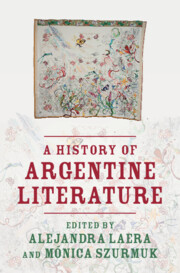Book contents
- A History of Argentine Literature
- A History of Argentine Literature
- Copyright page
- Contents
- Figures
- Contributors
- Editors’ Acknowledgments
- Introduction
- Part I Literary Dates
- Part II Critical Inroads
- Chapter 11 Print Culture in the Nineteenth Century
- Chapter 12 Criollismo: Gauchos in Literature and Film
- Chapter 13 Race and Nation
- Chapter 14 Science in Argentine Literature
- Chapter 15 Essay and Territory: The Geography of National Identity
- Chapter 16 Music as Sonic Literature
- Chapter 17 The Jewish Presence in Argentine Literature
- Chapter 18 Emancipation: Twentieth-Century Female Writers, Journalists, and Activists
- Chapter 19 Forsaking Tradition: Dislocating the Sovereignty of Argentine Literature
- Chapter 20 Mujeres raras: Patriarchal Nightmares, Dissident Imagination
- Part III Literary Names
- Index
- References
Chapter 17 - The Jewish Presence in Argentine Literature
from Part II - Critical Inroads
Published online by Cambridge University Press: 09 May 2024
- A History of Argentine Literature
- A History of Argentine Literature
- Copyright page
- Contents
- Figures
- Contributors
- Editors’ Acknowledgments
- Introduction
- Part I Literary Dates
- Part II Critical Inroads
- Chapter 11 Print Culture in the Nineteenth Century
- Chapter 12 Criollismo: Gauchos in Literature and Film
- Chapter 13 Race and Nation
- Chapter 14 Science in Argentine Literature
- Chapter 15 Essay and Territory: The Geography of National Identity
- Chapter 16 Music as Sonic Literature
- Chapter 17 The Jewish Presence in Argentine Literature
- Chapter 18 Emancipation: Twentieth-Century Female Writers, Journalists, and Activists
- Chapter 19 Forsaking Tradition: Dislocating the Sovereignty of Argentine Literature
- Chapter 20 Mujeres raras: Patriarchal Nightmares, Dissident Imagination
- Part III Literary Names
- Index
- References
Summary
This chapter proposes a reading of Argentine-Jewish literature that stresses key moments of production. It begins with a focus on Alberto Gerchunoff´s The Jewish Gauchos as the foundational text (and of modern Jewish literature in Spanish) and the moment of massive immigration. Gerchunoff is read alongside Borges, who is treated as a contrapunctual figure, a canonical writer who engages with transnational Jewish literatures and draws strategies from Jewish reading and writing to devise his own literary models. The second part examines the impact of the Shoah on Argentine Jewish literature of the 1950s and 1960s focusing on playwright Germán Rozenmacher and in the world of Yiddish and Ladino publishing. Tamara Kamenszain is subsequently described as an author that espouses “reluctant belonging,” someone who has engaged with different subjects and different styles but never ventures very far away from Jewishness. The third part treats the use of the Holocaust metaphorically to discuss state terrorism in the works of Reina Roffé and Sergio Chejfec. It concludes with a reflection on contemporary writing and the variety of literary genres.
Keywords
- Type
- Chapter
- Information
- A History of Argentine Literature , pp. 258 - 271Publisher: Cambridge University PressPrint publication year: 2024

